On-Page SEO Services
Best SEO Agency across US!
Get our Best On-Page SEO Services to maximize your Business Presentation.

What is On-Page SEO Service ?
Why Is On-page SEO Needed?
“On-page SEO analysis” refers to analyzing and improving each website component that may impact its performance in search results. Page SEO entails the structure, coding, keywords, Meta descriptions, and other components of the page that the search engine uses to determine the ranking.
Content is king, as we already know, and optimized content can rank on Google and propel your website to the top of the search results.
On-Page SEO services are provided by Andwepromote. We are an on-page SEO company that examines your website and content as part of our on-page SEO service to improve your search engine ranking.
Present Your Business Elegantly
We provide On-Page SEO Analysis.
On-Page SEO is essential for anyone who wants to rank in Google, as we’ve already explained. They must compete with each other based on their on-page SEO. Because it aids search engines in comprehending the content and website on the internet, on-page SEO is necessary. How can search engines accomplish that when they wish to rank a website that aids the user and their query and constantly assess the site’s relevance and content? The search engines will better understand your website if you optimize it for on-page SEO. As a result, you will now have more customers appropriate for your company and, ultimately, your traffic, which is also advantageous to you. Also, it will eventually raise your traffic and search engine rating.
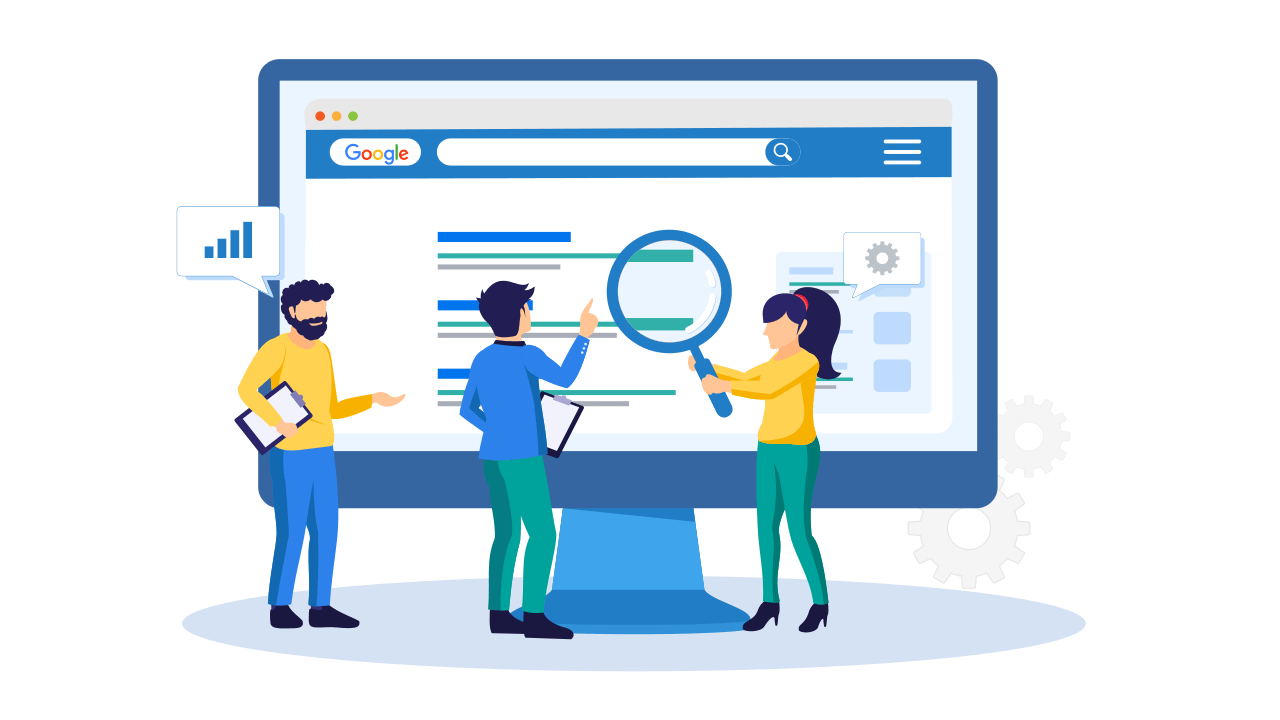
CHECK YOUR WEBSITE SEO SCORE
How Your Website is Performing?
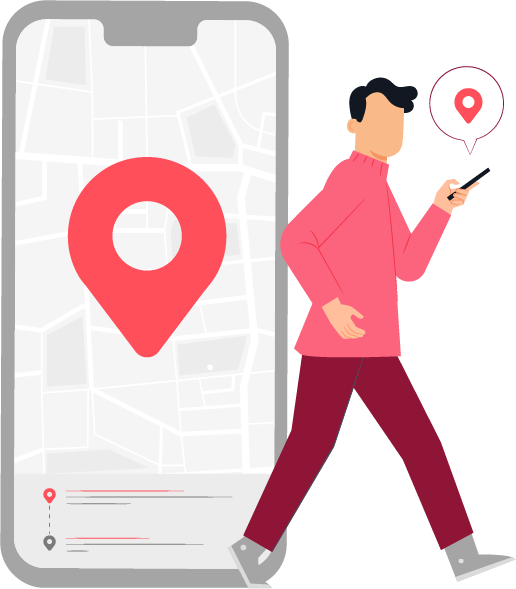
Unlimited Areas Of Our SEO Offering
- Increased search engine visibility: You may make your website more appealing to search engines and raise the likelihood that your pages will rank higher in search results by optimizing elements on your web pages like the title tag, meta description, and header tags.
- Increased website usability: By making it simpler for users to navigate and discover the information they need on your website, on-page SEO can also enhance user experience.
- Better targeting of keywords: You can target precise, industry-relevant keywords and phrases with on-page SEO, which can help you get more qualified traffic to your website.
- Increased brand awareness: You can position your brand as a trusted and authoritative source in your field by consistently updating your website with new, high-quality material.
- Better conversion rate optimization: You can enhance your website’s functionality overall and raise the likelihood that website visitors will become paying customers by optimizing it for both users and search engines.
Did You Know?
Top On-Page SEO Elements

Url With Keywords
As part of on-page SEO, your URL should contain relevant keywords. Incorporating keywords in your URL is a fantastic on-page SEO strategy because it aids search engines in comprehending the subject of your page and increases the likelihood that your page will appear in pertinent search results. Also, it aids users in quickly determining the topic of the page.

Title Tag
Because they aid both visitors and search engines in understanding the subject of a webpage at a glance, title tags are a crucial component of on-page SEO. It’s crucial to incorporate pertinent keywords in your title tags for your web pages and to make them interesting and helpful. Remember that the first 50–60 characters of a title tag are often displayed by search engines, therefore it’s crucial to keep them brief.
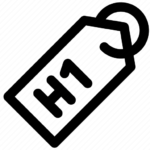
H1 or Heading Tag
An HTML tag called the H1 or heading tag is used to specify a webpage’s primary heading. It is regarded as a crucial component of on-page SEO because it aids in search engines’ comprehension of the organization and content of a webpage.
It’s also vital to note that H1 is the most significant heading tag and that H2, H3, H4, and so on should come after it. These header tags are used to denote the order of the material on a webpage, and search engines also utilize them to comprehend the structure of the page.
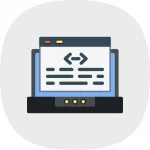
Meta Description Tags
Meta descriptions are crucial to On-Page SEO since they give search engines an overview of the information on the page. This data can be used by search engines to comprehend the page’s context and decide whether or not it is pertinent to a user’s search query.
In addition to including pertinent keywords or phrases, the meta description should be written in a way that accurately summarizes the information on the page. As SERPs only display the first 150–160 characters, it should be in this range.
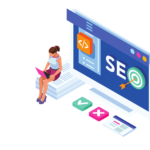
Content Optimization
Making adjustments to a webpage’s text to increase its relevance and exposure in search engine results pages is known as content optimization (SERPs). It is a crucial component of on-page SEO since it makes a website more visible in search results by assisting search engines in understanding its context and goals. To keep the content current and of the highest caliber, content optimization is a continuous process that needs to be monitored and updated frequently. Your content should be optimized for both search engines and consumers because search engines are becoming smarter and are better able to understand the intent of users.

Inbound or outbound Links
Backlinks or inbound links are references from other websites to a specific webpage. They are crucial for SEO since they let search engines know that other websites value and are relevant to the material on the page. A page is more likely to score well in search results in the more inbound links of high quality that it has.
Outbound links, on the other hand, lead to other websites from a given webpage. They are crucial for SEO since they let search engines know that the page’s content has been well-reviewed and is educational. Along with helping to share link equity, outbound links also give consumers access to more resources and data.

Canonical Tag
When many sites contain the same or similar information, a canonical tag (sometimes called a “real canonical” tag) is used to inform search engines which version of the webpage should be regarded as the “original” or “preferred” version.
Due to sorting and filtering options, tracking settings, and mobile versions, the canonical tag is particularly helpful for websites that have several versions of a page. By using the canonical tag, you may prevent duplicate content problems by instructing search engines which version of the page to index and show in search results.

Image and Alt tag
Alt tag optimization for images is a crucial component of on-page SEO. Pictures can significantly improve user experience, but they can also increase loading times and make it more challenging for search engines to grasp the content of a website.
A text description of an image can be provided using alt tags, commonly referred to as “alt attributes” or “alt descriptions.” They are included in the HTML code after the image tag.
Search engines can better grasp the context of the image and the page if the language in the alt tag appropriately describes the image and contains pertinent keywords or phrases. Also, it can help people who use screen readers to access the web and have visual impairments.

Keywords in Content
On-page SEO includes the usage of keywords in the content as a vital component. When searching for information online, users enter terms or phrases known as keywords. You can tell search engines what a page is about and improve its visibility in search results by incorporating pertinent keywords into the content of the page.
Search engines are becoming more intelligent and are more able to discern the intentions of users. Hence, delivering high-quality material that is educational, interesting, and contains relevant keywords is more crucial than simply filling content with keywords.
Why Your Business needs Our SEO Services?
Generating Leads in a Small Business is challenging; therefore, And We Promote is your go-to On-Page SEO Company our On-Page SEO experts are skilled in every way, and with us, you can significantly aid your business in the following ways:
- Increased organic traffic: By making your web pages more visible in search results, you can increase the number of people that visit your website.
- Higher search engine rankings: You can raise the position of your web pages in search engine results pages (SERPs) for particular keywords and phrases by making them more user-relevant and valuable.
- Increased visibility for long-tail keywords: You can increase the number of relevant visitors to your website by optimizing your web pages for long-tail keywords (more precise, lengthier phrases).
- Improved user experience: Our On-Page SEO expert can substantially increase your website’s general usability by making it interactive and simpler for users to navigate and obtain the information they require.
- Increased conversion rate: You can enhance your website’s functionality overall and increase the likelihood that website visitors will become paying customers by optimizing it for users and search engines.
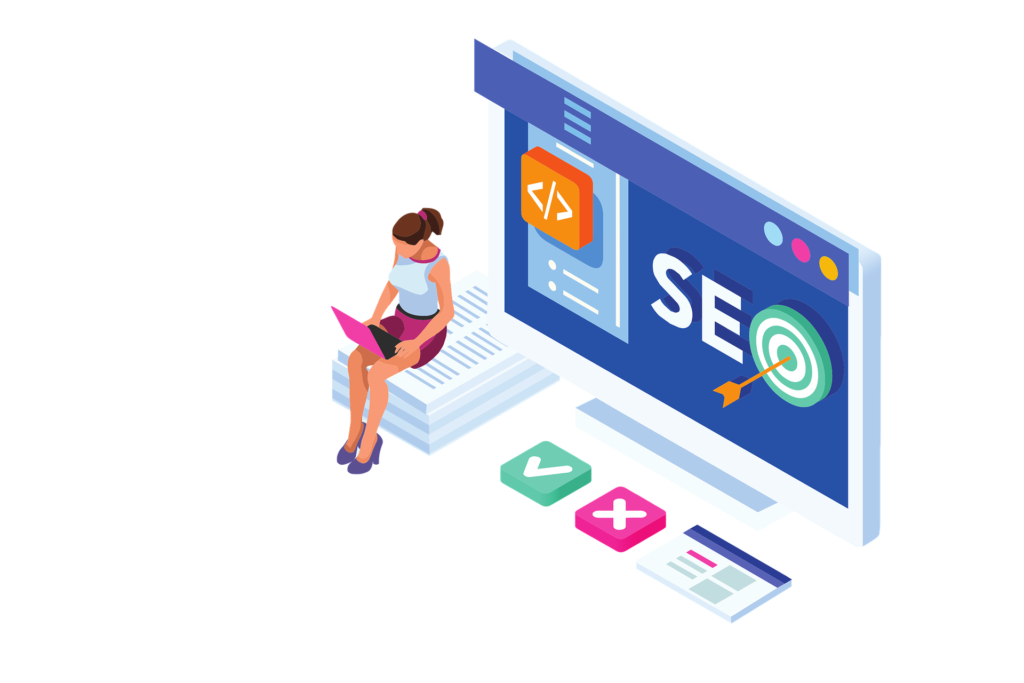

"I was skeptical about investing in SEO services, but this company has exceeded my expectations. Not only did they increase my website's search engine rankings, but they also helped me improve the overall user experience of my website. Their team is professional, responsive, and always willing to go the extra mile. I'm extremely satisfied with the results and highly recommend them."
Sarah Collins

"I have been working with this And We Promote for the past six months and have seen a significant increase in my website's search engine rankings and overall online visibility. The team is knowledgeable, responsive, and truly cares about the success of my business. I highly recommend them to anyone looking to improve their SEO!"
Emily White

"And We Promote has been a game-changer for my business. They took the time to understand my unique needs and tailored their services to fit them. The team is knowledgeable, friendly and always available to answer my questions. Thanks to their efforts, my website is now ranking on the first page of Google for my target keywords. I highly recommend this company to any business looking to improve their online presence."
Samantha Perters

"I never realized how much I was missing by not having a team like 'And We Promote' on my side for my SEO and Digital Marketing requirements which has given the much needed boost to my business."
William Benedict

"I have tried many SEO service providers before and most of them use the same old practices which yield no results. 'And We Promote' have proven that they use the newest techniques and practices in the everchanging nature of work which has gained my trust and actually bought results."
Steve Murphy

"'And We Promote' are the service providers that I would recommend for every business out there that can benefit from an online presence. They are the ones who showcase my business online and always keep me ahead of my competitors."
Emma Watson
Pricing Plan
SILVER
- No. of Keywords – 25
- Backlinks (per month) – 125
- Google My Business (GMB) – X
- Geotagging – X
Read More→
month
GOLD
- No. of Keywords – 50
- Backlinks (per month) – 250
- Google My Business (GMB) – ✓
- Geotagging – ✓
Read More→
month
PREMIUM
- No. of Keywords – 100
- Backlinks (per month) – 500
- Google My Business (GMB) – ✓
- Geotagging – ✓
Read More→
month
Send us your details to get started!
Speak to an expert to find out how Digital Consumer Intelligence will change the way you work.
FAQ's (Frequently Asked Questions)
What is On-page SEO?
On-page SEO refers to the optimizations made to individual pages on a website to help them rank higher and earn more relevant traffic from search engines. On-page SEO elements include title tags, header tags, meta descriptions, content optimization, keyword targeting, and internal linking. The goal of on-page SEO is to help search engines understand the purpose and context of a website and its pages to deliver the right results to users searching for relevant keywords.
What are keywords?
Keywords are specific terms or phrases that describe the main topic or subject of a piece of content, such as a web page, blog post, or article. In search engine optimization (SEO), keywords are used to identify the topics for which the content is relevant and help search engines understand what the content is about. By including keywords in the content, website owners can help search engines understand the relevancy and authority of their website, which can impact their rankings and visibility in search engine results pages (SERPs).
What keywords do I Rank for?
Keywords are phrases or terms people type into search engines when looking for information online. To find out which keywords your website is ranking for, you can use tools like Google Search Console, SEMrush, or Ahrefs. These tools will show you the keywords for which your website appears in search engine results and the rankings for each keyword. By knowing which keywords you rank for, you can identify areas where you need to improve your on-page and off-page SEO efforts to boost your rankings and drive more traffic to your website.
How to conduct keyword research?
Keyword research identifies and selects keywords to target in your website’s content to rank higher in search engines. Here are the steps for conducting keyword research:
- Determine your target audience: Before researching keywords, you need to know your target audience, their needs, and the type of content they’re searching for.
- Create a list of seed keywords: Start by listing keywords related to your business, industry, or product/service.
- Use keyword research tools: Use keyword research tools such as Google Keyword Planner, Ahrefs Keyword Explorer, or SEMrush to get insights into the keywords you’re targeting, such as monthly search volume, competition, and more.
- Look at the search results: Look at the search results of the keywords you’re targeting to see what type of content is ranking and how you can differentiate yourself.
- Identify long-tail keywords: Long-tail keywords are specific, multi-word phrases that target a more specific audience. They’re usually easier to rank for and can drive more targeted traffic to your website.
- Analyze keyword difficulty: Check the difficulty of ranking for your target keywords by looking at factors such as the competition level, search volume, and the quality of top-ranking content.
- Group keywords: Group similar keywords together to form a keyword cluster, making creating targeted, relevant content easier.
What is your Keyword Selection Process?
Our process of selecting keywords involves the following steps:
- Define your target audience and their needs: Knowing your target audience and what they’re searching for is key to choosing the right keywords.
- Identify relevant keywords: Research and identify keywords relevant to your business, products, or services and target audience.
- Evaluate keyword competition: Analyze the level of competition for each keyword to determine its feasibility for ranking on search engines.
- Consider the search volume: Choose keywords with a high monthly search volume, indicating high interest among users.
- Relevance and specificity: Prioritize keywords with specific relevance rather than generic terms with broad meanings.
- Incorporate keywords into your website: Finally, integrate your selected keywords into your website’s content, meta tags, and URLs for better visibility and ranking on search engines.
Which On-Page SEO techniques are popular?
On-page SEO refers to optimizing individual pages to rank higher and earn more relevant traffic from search engines. Some of the popular on-page SEO techniques include:
- Keyword optimization: selecting relevant and high-traffic keywords to target and using them in the title, meta description, header tags, and body content.
- Content optimization: Creating high-quality, unique, and relevant content that provides value to the users.
- URL optimization: Creating descriptive and concise URLs that accurately reflect the content of a page.
- Image optimization: Using relevant, descriptive, and optimized images and alt tags to improve the user experience and accessibility of a website.
- Header tags optimization: Using header tags (H1, H2, H3, etc.) to structure the content and provide a clear hierarchy for the users and search engines.
- Internal linking: Creating a clear and logical internal linking structure to help search engines and users navigate the website and understand the relationships between pages.
- Page speed optimization: Improving the page load speed of a website to provide a better user experience and improve the website’s rankings.

We’re Here To Help
Get the Best SEO Services with AndWePromote.